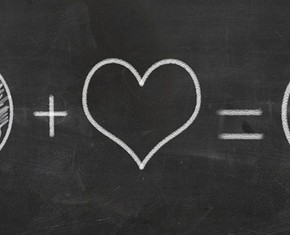The views expressed in our content reflect individual perspectives and do not represent the authoritative views of the Baha'i Faith.
Let’s see if we can attempt to answer the eternal human question – “Do I have a soul?” – by first defining the word. These three definitions progress from the simplest to the most complex.
Here’s how Wikipedia defines the soul:
Soul or psyche (Ancient Greek: ψυχή psykhḗ, of ψύχειν psýkhein, “to breathe”) comprises the mental abilities of a living being: reason, character, feeling, consciousness, memory, perception, thinking, etc. Depending on the philosophical system, a soul can either be mortal or immortal.
In contrast, here’s how Webster’s dictionary defines it:
soul (sōl) n. [[OE: sawol]] 1 an entity without material reality, regarded as the spiritual part of a person 2 the moral or emotional nature of a person
Finally, Baha’u’llah, the prophet and founder of the Baha’i Faith, defined the soul this way:
Verily I say, the human soul is, in its essence, one of the signs of God, a mystery among His mysteries. It is one of the mighty signs of the Almighty, the harbinger that proclaimeth the reality of all the worlds of God. Within it lieth concealed that which the world is now utterly incapable of apprehending. …
Verily I say, the human soul is exalted above all egress and regress. It is still, and yet it soareth; it moveth, and yet it is still. It is, in itself, a testimony that beareth witness to the existence of a world that is contingent, as well as to the reality of a world that hath neither beginning nor end. – Gleanings from the Writings of Baha’u’llah, pp. 160-162.
Judging from the simplest definition here – that the soul comprises our human mental abilities – we can positively answer the question “Do I have a soul?” with confidence. Without a doubt, every human being has at least some mental abilities, and therefore has a soul.
However, if we move to the next definition and the next level of complexity, where Webster’s defines a soul as a spiritual entity “without material reality,” some people start to have trouble. If we can’t see or touch it, many might ask, how can we know it exists? The Baha’i teachings address this important question by saying that we perceive two kinds of human knowledge:
One is the knowledge acquired through the senses. That which the eye, the ear or the senses of smell, taste or touch can perceive is called “sensible.” For example, the sun is sensible, as it can be seen. … These are called sensible realities.
The other kind of human knowledge is that of intelligible things: that is, it consists of intelligible realities which have no outward form or place and which are not sensible. For example, the power of the mind is not sensible, nor are any of the human attributes: These are intelligible realities. Love, likewise, in an intelligible and not a sensible reality. For the ear does not hear these realities, the eye does not see them … Likewise, nature itself is an intelligible and not a sensible reality; the human spirit is an intelligible and not a sensible reality. – Abdu’l-Baha, Some Answered Questions, newly revised version, pp. 93-94.
Certainly, with this explanation in mind, we can agree that the Webster’s definition of the human soul makes sense. It describes something without form, something we cannot see or touch but which we all instinctively know we possess – an inner spirit that contains our “moral or emotional nature.” The fact that we have feelings, principles, thoughts, desires and aspirations proves that an intangible part of us, the inner spirit in each person, is real.
Baha’u’llah’s mystical definition of the human soul goes far beyond these simpler descriptions, challenging us to understand its mystery. What did Baha’u’llah mean, for example, when he wrote that the soul “… is, in itself, a testimony that beareth witness to the existence of a world that is contingent, as well as to the reality of a world that hath neither beginning nor end.”?
Perhaps a “contingent world,” in this context, indicates the one we live in every day; and “a world that hath neither beginning nor end” means the wider and larger eternal reality beyond this merely temporal and physical existence here on Earth. From a Baha’i perspective, then, the human soul has a two-fold reality, one that exists both in the contingent world and the world beyond the merely material one.
The Baha’i teachings say one proof of that reality comes from the fact that everyone experiences the dual nature of their soul when they dream:
… this immortal human soul is endowed with two means of perception: One is effected through instrumentality; the other, independently. For instance, the soul sees through the instrumentality of the eye, hears with the ear, smells through the nostrils and grasps objects with the hands. These are the actions or operations of the soul through instruments. But in the world of dreams the soul sees when the eyes are closed. The man is seemingly dead, lies there as dead; the ears do not hear, yet he hears. The body lies there, but he – that is, the soul – travels, sees, observes. All the instruments of the body are inactive, all the functions seemingly useless. Notwithstanding this, there is an immediate and vivid perception by the soul. Exhilaration is experienced. The soul journeys, perceives, senses. – Abdu’l-Baha, The Promulgation of Universal Peace, p. 416.
Do I have a soul? Absolutely, the Baha’i writings assure us. Our souls, in fact, unlike our bodies, will live forever:
… man is possessed of two realities, as it were: a reality connected with the senses which is shared in common with the animal, and another reality which is conscious and ideal in character. This latter is the collective reality and the discoverer of mysteries. … Therefore, it is real, eternal and does not have to undergo changes and transformations. – Abdu’l-Baha, The Promulgation of Universal Peace, p. 417.
















Comments
Sign in or create an account
Continue with Googleor